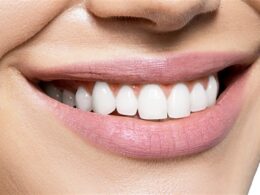Posted on: October 7, 2021
If you experience sharp or stinging pain when you eat certain foods or drink certain beverages, then you may have sensitive teeth and gums. Although they’re common, they’re inconvenient and painful. However, the condition is easily treatable, and with a few lifestyle changes, you may be able to eliminate the pain of sensitive teeth.
Sensitive teeth can remove much of the enjoyment of eating because you never know when you’ll experience excruciating pain. For some, breathing cold air into their mouths will cause extreme pain. If you learn the causes and treatments for sensitive teeth, it will go a long way toward alleviating the pain they cause. You’ll once again be able to eat the foods you like and enjoy the activities that may have become off-limits due to your sensitive teeth.
When your tooth enamel erodes due to food acids or any other cause, then the tooth root can be exposed, and you’ll experience pain. Cracked teeth and decay can also cause your teeth to become sensitive, so if you notice decay or a cracked tooth, don’t delay in seeking prompt treatment from your dentist.
Receding gums are another cause of sensitive teeth because the root is exposed. If you brush aggressively, it can cause your gums to recede, but changing your brushing habits can help remedy the problem.
Since there are so many treatments for sensitive teeth, the best recourse is to determine the cause of their sensitivity. If your teeth are sensitive, desensitizing toothpaste may help. Desensitizing toothpaste is different than toothpaste for sensitive teeth. It reduces the ability of the nerves to respond to painful substances and usually makes a noticeable difference within a few days. Fluoride supplements can strengthen weak tooth enamel, whether the weakness is due to heredity or external factors. Sealants can also help because they block irritants from reaching the tooth nerve. If these solutions are ineffective, then a root canal and crown can remove the nerve and restore the tooth to functionality.
What Causes Sensitive Teeth?
- Brushing too aggressively or with the wrong type of toothbrush can damage your tooth enamel, and your teeth can become sensitive. Use a soft-bristled toothbrush and gentle pressure to avoid damage to your tooth enamel.
- Consuming acidic substances can cause pain when the acids reach the nerves. Avoiding citrus fruits, pickles, tomatoes, and anything else that’s acidic can help with your pain factor.
- Bruxism, or tooth grinding, is a major cause of sensitive teeth because it exposes the nerves so that foreign substances can reach the nerve and cause pain. Bruxism can be treated using a custom nightguard available from your dentist.
- Receding gums caused by gum disease can expose your tooth nerves, but your dentist can treat the inflammation and then apply a sealant to protect the tooth enamel.
- A recent dental procedure can leave your teeth sensitive for a short while. It shouldn’t persist, however, so if it does, contact your dentist because you may have developed an infection.
- A chipped or cracked tooth can allow substances to reach the nerve, so schedule a dental visit without delay if you notice a chip or crack in any of your teeth.
- Tooth-whitening ingredients can sometimes cause sensitive teeth, so if you’re using tooth-whitening products, switch to brands that are specifically formulated for sensitive teeth.
- Alcohol or other mouthwash ingredients can aggravate sensitive teeth, so switch to a brand that has fluoride and is formulated for sensitive teeth.
- If you notice decay around an old filling, make a dental appointment without delay. Your old filling may have malfunctioned and be allowing foreign substances inside the tooth.
Sensitive teeth are sometimes due to serious underlying problems, so if you have sensitive teeth, then make an appointment with your medical or dental professional. Prompt treatment will provide the best results, and you’ll be able to resume the activities you enjoy and the foods you love to eat.
How Can I Help My Sensitive Teeth?
There are steps you can take to alleviate tooth sensitivity, and they can help your dentist pinpoint the cause, such as:
- Avoid acidic foods and beverages such as lemons, oranges, tomatoes, iced coffee, lemonade, and so forth. If you eat or drink any of these, then rinse your mouth well with plain water as soon as you can.
- Use a toothpaste and mouthwash that are formulated for sensitive teeth and make sure they contain fluoride.
- Wear a nightguard if you have bruxism. Be sure to order one from your dentist, as those from the corner pharmacy won’t fit as well and may fall out.
- Be dedicated to your oral hygiene regimen and don’t skip it at night or in the morning.
- Schedule regular dental checkups.
- Use a soft-bristled toothbrush and brush gently.
Knowing how to help sensitive teeth is as important as knowing what causes them to be sensitive. Be proactive in caring for your sensitive teeth and listen to your dentist’s advice for the best way to live with tooth sensitivity until you have cured it.
What Makes Sensitive Teeth Better?
Although nothing will work better than an appointment with your dentist to discover the cause of your tooth sensitivity, the following tips can help in the interim.
- Look into topical fluoride treatments that are applied to the sensitive areas of your teeth. They can also be applied to all the teeth and will strengthen the enamel. This will help ward off sensitivity.
- Use desensitizing toothpaste, which is not the same as toothpaste for sensitive teeth. A desensitizing toothpaste will cause the teeth to become less sensitive, and you should notice a difference within a few days.
- If your teeth are sensitive because you have receding gums, a gum graft can cover the nerves and eliminate substances from reaching the nerves.
Sensitive teeth are both preventable and curable, so don’t suffer from the pain of sensitive teeth if you have them. Be diligent in your oral hygiene program and follow the American Dental Association guidelines for healthy teeth and gums. Use a soft-bristled toothbrush and desensitizing toothpaste, and brush gently.
Make an appointment with your dentist to determine the cause of your tooth sensitivity and the best recourse for eliminating it. With proper care and maintenance, your teeth can last throughout your life, and you won’t need the inconvenience and pain of false teeth or the expense of dental implants.






